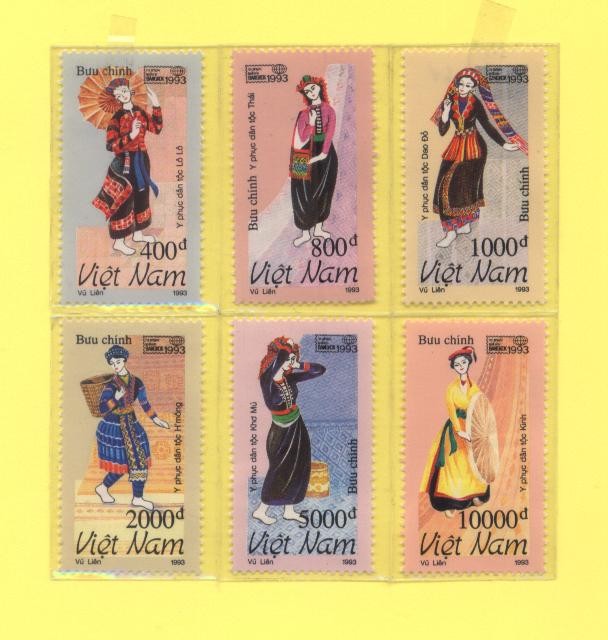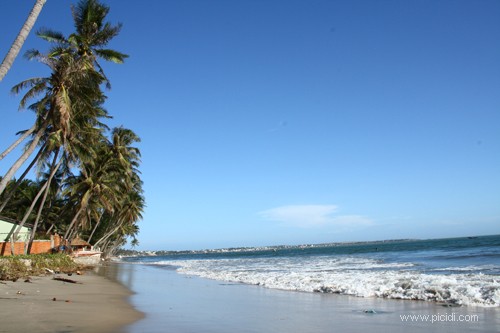A: Welcome to VOV’s Letter Box. This feature airs every Wednesday. Each week when we receive letters and emails from listeners around the world, we find that some of the listeners care about political issues in Vietnam while a majority are keenly interested in Vietnamese cultural, historical, and social issues.
B: How about Patrick Travers from South Anston, Sheffield, England, a new name to the program? Patrick tuned in to an English broadcast on February 28th at 12.36 GMT. In his letter, though Patrick didn’t say explicitly which areas he’s interested in, we got the impression he prefers social, cultural, and tourist information. If that’s correct, he can be sure that we have lots of stories on these subjects. For details of our daily schedule of English programs, please log onto our website at www.vovworld.vn, where you can read or listen to both live broadcasts and previously recorded programs.
A: By the way, we would like to inform you that beginning April 1st, our Monday segment Land will be replaced by a feature called ‘Colorful Vietnam –Vietnam’s 54 ethnic groups’. We will tell you about the daily life, culture, costumes, cuisine, language, economic progress, and preservation of tradition of Vietnam’s various ethnic groups during the nation’s integration process. The first edition of ‘Colorful Vietnam –Vietnam’s 54 ethnic groups’ will be broadcast on Monday April 1st. We hope you’ll join us.
B: Last week, Sanusi Isah Dankaba asked about Vietnam’s Muslim population. Although Islam is a huge world religion, Muslims account for a very small percentage of Vietnam’s total population. According to an April 1999 census, there are approximately 63,000 Muslims in Vietnam, 77% of them in the Southeast region.
A: In the middle of the 19th century, under French rule in Indochina, many Muslims moved to the Mekong River Delta from Cambodia. That is the reason why most Muslims in Vietnam live in the central or southern region.
B: Sanusi also wants to know about religious festivals in Vietnam. Dear Sanusi, Vietnamese people have a great variety of festivals throughout the year in all parts of the country. Many festivals relate to religion or victories over past enemies and are often very colourful. In between are countless local festivals, most notably in the Red River Delta, honouring the tutelary spirit of the village or community temple.
 |
| Stamp collection featuring major ethnic groups in Vietnam (Photo: Internet) |
A: There are 54 ethnic groups scattered throughout Vietnam, but a large majority are Kinh people, whose Lunar New Year or Tet Festival is the biggest event of the year. Although Tet is now celebrated all over the country, minority groups also hold their own unique celebrations.
B: The ethnic minorities punctuate the year with rituals tied to sowing, harvesting or hunting, as well as elaborate rites surrounding birth and death. The Cao Dai religion has its own array of festivals, while Christian communities throughout Vietnam observe the major Christian ceremonies. Christmas is observed as a religious festival mainly by the faithful, though it’s becoming a popular event for non-Christian Vietnamese as an excuse to shop and party.
A: Other festivals that should not be missed if you have a chance to visit Vietnam are the Cau Ngu festivals held by fishermen to pray for bumper catches and safety at sea as well as peace, happiness, and prosperity throughout the year; the Nui Ba festival in Tay Ninh province; the Huong or Perfume Pagoda festival; the cow racing festival governed by the Khmer calendar; the Hung Temple festival; the summer solstice festival, also known as the parasite-killing festival; the mid-autumn festival; the Oc Om Boc festival of the Khmer people; the Ba Chua Xu festival, also known as the Via Ba Ceremony in Chau Doc, An Giang province; and the Kate festival of Cham ethnic group.
A: It’s March and summer is coming. To help shortwave listeners tune in our English programs, we’ve made some minor changes to our frequency list for summer. Of course, we’ll send all of you a copy of it. If you can’t wait, log on to our website at www.vovworld.vn to preview it. The weather in Vietnam has started to get hot, especially at midday. How’s the weather in your country, dear listeners? Can you feel the onset of summer?
B: In Vietnam, if spring is the time of festivals, summer is for vacations. With children enjoying a 3-month school holiday from late May to early September, it’s a time for family vacations and many Vietnamese families like to go the beach during this time. But there is growing enthusiasm for adventure tours of the northern mountain region.
A: In addition to noting what you are able to catch in our broadcasts, and each program’s time and frequency, we hope you’ll say specifically why you like this or that program. Any comments from you will help us improve the programs.
B: For example, Ratan Kumar Paul, a teacher and co-ordinator of the South Asia CRI DXER Forum, wrote that he liked the broadcast on March 6th and 7th in which we had a commentary on the death of Venezuela’s President Hugo Chavez. He explained why he was interested in the Letter Box of March 6th and why he enjoyed the March 3rd Sunday show where we discussed the survival prospects of Vietnam’s golden-headed langurs.
A: Through such comments we discover your real interests and topics to be further explored in future programs. And now, as usual, we’d like to spend a little time mentioning the names of listeners who sent us postal or electronic mails during the week. This is a token of our love and thanks to all VOV listeners for faithfully tuning in our programs over the years.
B: This week we salute listeners John Bradford of Wilmington, Delaware, USA, Yoshihiro Kusanagi of Ota-ku, Tokyo, Japan, Paul Hayes, a member of the British DX Club in Limerick, Ireland, and Giorgio Brignola of Genova, Italy.
A: This week, we received more letters from Swedish listeners than usual. They are Rolf Ahman of Alvsjo, Rolf Johansson of Tibro, Anders Brissman of Vastra Langgatan, Tibro, and Christer Brunstrom of Halmstad, Sweden.
B: All these listeners sent reports of the English programs they heard and comments about technical issues and program contents. We greatly appreciate this feedback. Dear listeners, your reception reports were all complete enough for us to send you letters of confirmation.
 |
| Phan Thiet beach (Photo: Internet) |
A: We’re glad to know that more and more Swedish listeners are interested in our programs. For a long time, in the hearts of many Vietnamese people, Sweden has been a very special friend. During the war time, in 1969, Sweden became the first Western country to establish diplomatic ties with Vietnam. It was also a Western country which strongly supported Vietnam’s resistance war against American imperialists, and in 1970, Sweden opened an embassy in Hanoi.
B: Today, relations between Vietnam and Sweden have developed strongly in politics, diplomacy, economics, trade, investment, and education. As for VOV, Sweden has provided much support. It helped VOV, particularly its English section successfully develop live broadcasts.
A: We hope that through our programs more and more Swedish people will come to know Vietnam and its latest developments. That’s it for today’s Letter Box. Please keep in touch. We look forward to receiving your comments and suggestions. Our contact address is:
The English program,
Overseas Service, Radio Voice of Vietnam,
45 Ba Trieu Street, Hanoi, Vietnam
B: Or you can email us at: englishsection@vov.org.vn. If you miss any of our programs, you can always catch up by logging onto our website at: www.vovworld.vn, where you can hear both live broadcasts and previously recorded programs.
Bao Tram